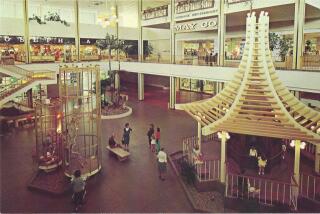Campeau to Build Shopping Malls in U.S. : Ohio Developer DeBartolo Is Partner in Plan for Up to 30 Projects
- Share via
TORONTO — Robert Campeau, the Canadian developer who succeeded in a stunning takeover of Federated Department Stores, and an Ohio development partner Thursday announced plans to build as many as 30 malls in the United States by 1993.
The ambitious plans were announced to a standing-room-only crowd of nearly 400 shareholders, securities analysts and reporters at Campeau Corp.’s annual meeting in the stately Royal York Hotel in Toronto, the company’s headquarters city.
According to Edward J. DeBartolo Sr., the Ohio developer whose partnership with Campeau helped the Canadian secure Federated, the centers would be anchored in part by upscale stores, notably Bloomingdale’s, which were the booty in Campeau’s $8.8-billion takeover of Federated in May, after a hard-fought, 2 1/2-month battle.
The malls would be developed at the rate of as many as 10 a year and at an annual cost of as much as $1 billion beginning in 1990, DeBartolo, who usually shuns interviews, told reporters after the meeting. The Campeau-DeBartolo agreement calls for the two to be equal partners in all of Campeau’s future department store operations in the United States.
Left unanswered was a burning question for Southern California shoppers: When will Bloomingdale’s be coming to town? Although Campeau has stressed that Los Angeles is a high-priority market for expansion of the East Coast-based chain, he would not be pinned down on timing. DeBartolo, in fact, said he expects Seattle to be the chain’s first West Coast location.
“We can do it,” DeBartolo, based in Youngstown, Ohio, said in response to questions about widespread concerns among retail industry observers that the United States already is overstocked with stores. “The prospects are promising.”
DeBartolo’s comments provided vivid elaboration on remarks made by John W. Burden III, a former Federated vice chairman who was recently appointed chairman of Campeau’s retailing operations.
An immediate objective, Burden said, is to “build a bridge between (Campeau Corp.’s) retail and real estate” operations, which he said provide an “unprecedented opportunity” for synergy. “We have tremendous opportunities for launching more strategically” the department stores that are Campeau’s main focus, he added.
Those chains include units such as Jordan Marsh and Maas Bros., remaining from Campeau’s first foray into U.S. retailing with the takeover of Allied Stores in 1986.
(Ironically, DeBartolo and Campeau tangled over control of Allied but emerged as partners in the Federated deal, illustrating a point often made by Campeau that he does not hold grudges and likes to make friends of past enemies. Said DeBartolo of Campeau: “I think he’s a pretty exciting guy. He’s got a lot of guts.” DeBartolo and Bloomingdale’s Chairman Marvin S. Traub were elected Thursday to Campeau’s board.)
Campeau himself, who declined to explain a bandage on his left hand and wrist, told shareholders of plans to develop major centers in downtown Brooklyn and Boston. With chains such as Bloomingdale’s, Rich’s and Burdines, the company is “all set to go.”
“Nothing can stop us but ourselves,” he added.
‘Cannibalize’ Sales
This is despite the current mediocre retailing environment, Campeau said at a news conference after the one-hour, 45-minute meeting. Asked whether he is concerned about the company’s massive debt at such a time, Campeau said: “I have no concern whatsoever. Basically, our plan was for no growth (in sales) this year.” But he acknowledged that it “has not been a good six months for retail.”
A Toronto retail analyst was somewhat sanguine about Campeau’s expansion plans. “Obviously it depends on the environment. You have a strong alliance here,” said George Hartman of Brown Baldwin Nisker. A Bloomingdale’s in a new market, he said, could “cannibalize” sales of other retailers.
One key to success, Campeau said, will be customer service. He said a task force is working to come up with ways to improve service at Federated and Allied stores, with an eye toward knocking the service-minded Nordstrom from its perch by 1989.
Campeau boasted to shareholders of his company’s progress in reducing the combined debt loads from the Allied and Federated acquisitions. After the sale of $4.4 billion in assets--including the $1.1-billion sale of Bullock’s-Bullocks Wilshire and I. Magnin to R. H. Macy & Co.--Campeau Corp. will have a total debt of about $5.2 billion. The debt level has recently been as high as $8 billion, Campeau advisers said. Other savings have been realized by the layoffs of about 4,000 Federated workers and the consolidations or closings of offices--part of a drive to cut costs by $250 million a year.
Separately, Campeau Corp. reported Thursday that earnings from its continuing operations for the quarter ended April 30 rose to $57 million, compared to $59 million in the like 1987 quarter. First-quarter net earnings totaled $174 million, in contrast with a loss of $74 million in the year-ago period. Most of the improvement resulted from pretax gains of $393 million from the sale of assets, including $360 million from the sale of Brooks Bros., an Allied division, to Marks & Spencer. The period preceded the Federated takeover.
More to Read
Inside the business of entertainment
The Wide Shot brings you news, analysis and insights on everything from streaming wars to production — and what it all means for the future.
You may occasionally receive promotional content from the Los Angeles Times.











